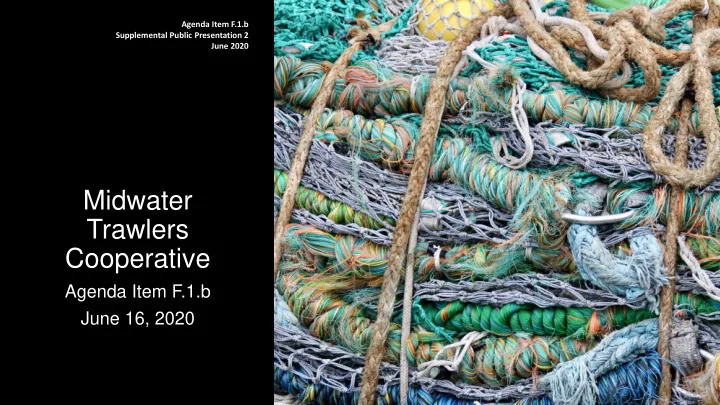

Agenda Item F.1.b Supplemental Public Presentation 2 June 2020 Midwater Trawlers Cooperative Agenda Item F.1.b June 16, 2020
Considerations for Stock Inclusion in an FMP Species Requires Federal Management Species is Important to Marine Ecosystem Stock is Caught by the Fishery FMP would Improve or Maintain Stock Status The Stock is a Target of a Fishery The Stock is Important to Commercial, Recreational or Subsistence Users The Fishery is Important to the Nation or Regional Economy There is a Need to Resolve Competing Interests The Economic Condition of a Fishery and Can an FMP Produce More Efficient Utilization Is There a Developing Fishery and Can an FMP Better Foster Orderly Growth Is the Fishery Already Adequately Managed …by Industry Self-regulation Consistent with MSA Requirements and Other Applicable Law
(13) Ecosystem Component Species (see §§600.305(c)(5) and 600.310(d)(1)) are stocks that a council or the Secretary has determined do not require conservation and management, but desire to list in an FMP in order to achieve ecosystem management objectives. MONITORING WILL STILL OCCUR!
Whiting Operations Do Not Want Shortbelly • There is no market for shortbelly • Shortbelly damages the quality of the whiting it is mixed with • Whiting fishermen using electronic monitoring (which is all but one vessel) are required to retain any shortbelly caught • Processors do not want shortbelly – it is a hassle to unload and has virtually no economic value • Fishermen who bring in shortbelly are rarely compensated • If the boat is not making money the crew is not making money
Commercial Fishing is For Economic Benefit • The Pacific Whiting fishery generates millions of dollars in revenue annually and it supports harvesters, processors, suppliers and coastal communities • Whiting is a sustainable fishery which provides an inexpensive and healthy protein source for U.S. and world markets • Whiting is a high-volume low-value fishery, so every trip counts • Whiting fishermen are avoiding several species while targeting the whiting fishery, most importantly Chinook Salmon • Whiting catcher vessels are the largest trawl vessels on the west coast and have 4-5 member crews – these are expensive vessels to run before adding in the additional cost of Buyback Loan payments, Cost Recovery payments, costs of cooperative management and 100% monitoring requirements In Short, EVERY Haul Counts!!!
NO MARKET Shortbelly Rockfish • There is no market for shortbelly, and none envisioned • Whiting sectors are not harvesting sector allocations as it is, Council is considering action to increase mothership sector utilization, why would industry want to develop a fishery for shortbelly - a species that is valued at a fraction of what whiting is worth? • Whiting processors don’t want the fish even if it is free to them – that should tell everyone something!
Two Lightning Strikes in 2020 • Two Vessels had lightning strikes in May of 2020 • Approximately 145 metric tons of shortbelly was caught between the two vessels • Both trips were economic losses for the vessel as the fish was required to be retained and delivered due to the vessels utilizing electronic monitoring – the trips were both cut short and the vessels returned to port • A vessel that can deliver 300,000 – 350,000 pounds of whiting at approximately $0.08/pound should have gross earnings of $24K-30K – instead not only did they have no earnings from whiting, they had all the expense of the trip
Recommended Action Meets MSA National Standards NS 1: Achieving OY for Whiting Stock NS 2: Using the Best Available Science to Make Mgt Decisions NS 3: Managing Stocks as a Unit Throughout Their Range NS 5: Consider Efficiency in the Utilization of Resources NS 6: Allow for Variations and Contingencies NS 7: Minimize Costs and Avoid Unnecessary Duplications NS 8: Consider Fishing Communities NS 9: Minimize Bycatch To the Extent Practicable
Bottom Line The Pacific whiting industry does not need a regulation to disincentivize shortbelly interactions Daily monitoring within the Whiting Coops will continue as EC Species NMFS and/or Council always has ability to revisit if something changes dramatically
QUESTIONS?
Recommend
More recommend